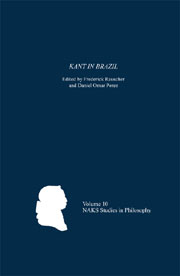Book contents
- Frontmatter
- Contents
- Acknowledgments
- Note on Sources and Abbreviations
- Introduction
- 1 Two Centuries of Kantian Studies in Brazil
- 2 Self-Consciousness and Objective Knowledge in the Transcendental Deduction of the Critique of Pure Reason
- 3 Intuitive Knowledge and De Re Thought
- 4 Predicative Judgments and Existential Judgments: Apropos Kant's Critique of the Cartesian Ontological Argument
- 5 An Experiment with Practical Reason
- 6 On the Faktum of Reason
- 7 Critique, Deduction, and the Fact of Reason
- 8 The Noncircular Deduction of the Categorical Imperative in Groundwork III
- 9 The Distinction between Right and Ethics in Kant's Philosophy
- 10 Right and the Duty to Resist, or Progress toward the Better
- 11 The Fundamental Problem of Kant's Juridical Semantics
- 12 Right, History, and Practical Schematism
- 13 Cosmopolitanism: Kant and Kantian Themes in International Relations
- 14 A Typology of Love in Kant's Philosophy
- 15 The Meaning of the Term Gemüt in Kant
- 16 Between Prescriptive Poetics and Philosophical Aesthetics
- 17 The Purposiveness of Taste: An Essay on the Role of Zweckmässigkeit in Kant's Critique of Aesthetic Judgment
- 18 Freedom in Appearance: Notes on Schiller and His Development of Kant's Aesthetics
- 19 Reading the Appendix to Kant's Critique of the Teleological Power of Judgment
- 20 Symbolization in Kant's Critical Philosophy
- Bibliography of Works in German and English
- List of Contributors
- Index
19 - Reading the Appendix to Kant's Critique of the Teleological Power of Judgment
Published online by Cambridge University Press: 05 February 2013
- Frontmatter
- Contents
- Acknowledgments
- Note on Sources and Abbreviations
- Introduction
- 1 Two Centuries of Kantian Studies in Brazil
- 2 Self-Consciousness and Objective Knowledge in the Transcendental Deduction of the Critique of Pure Reason
- 3 Intuitive Knowledge and De Re Thought
- 4 Predicative Judgments and Existential Judgments: Apropos Kant's Critique of the Cartesian Ontological Argument
- 5 An Experiment with Practical Reason
- 6 On the Faktum of Reason
- 7 Critique, Deduction, and the Fact of Reason
- 8 The Noncircular Deduction of the Categorical Imperative in Groundwork III
- 9 The Distinction between Right and Ethics in Kant's Philosophy
- 10 Right and the Duty to Resist, or Progress toward the Better
- 11 The Fundamental Problem of Kant's Juridical Semantics
- 12 Right, History, and Practical Schematism
- 13 Cosmopolitanism: Kant and Kantian Themes in International Relations
- 14 A Typology of Love in Kant's Philosophy
- 15 The Meaning of the Term Gemüt in Kant
- 16 Between Prescriptive Poetics and Philosophical Aesthetics
- 17 The Purposiveness of Taste: An Essay on the Role of Zweckmässigkeit in Kant's Critique of Aesthetic Judgment
- 18 Freedom in Appearance: Notes on Schiller and His Development of Kant's Aesthetics
- 19 Reading the Appendix to Kant's Critique of the Teleological Power of Judgment
- 20 Symbolization in Kant's Critical Philosophy
- Bibliography of Works in German and English
- List of Contributors
- Index
Summary
Nature in its purposive forms speaks figuratively to us, says Kant; the interpretation of its cipher yields us the phenomenon of freedom in ourselves.
F. W. J. von Schelling, System of Transcendental IdealismThe subject of this article is the second part of Kant's Critique of the Power of Judgment, concerning teleological judgment. The aim is to show through a close reading of the appendix the role of reflective teleological judgments in promoting the connection or transition (Übergang) between the theoretical and the practical principles of reason as a single faculty. Such a reading implies that the text of the appendix is a consistent and coherent part of Kant's exposition in the third Critique. That the third Critique deals with this connection in its different configurations is what Kant states in both introductions, the definitive and the discarded, to the Critique of the Power of Judgment (5:176–79 and 20:193–208). Within the scope of the critical examination of reflective judgment in its teleological function, the connection between practical and pure reason discovers itself in a manner that shows that a transcendental meaning, rather than transcendent, must be attributed to the concepts examined in the second Critique concerning practical reason, namely, those of a highest good, of a deity, of the immortality of the soul, and of freedom.
- Type
- Chapter
- Information
- Kant in Brazil , pp. 337 - 347Publisher: Boydell & BrewerPrint publication year: 2012



